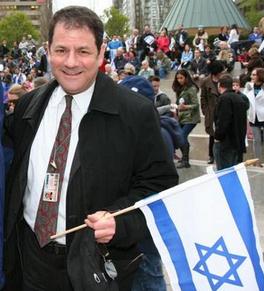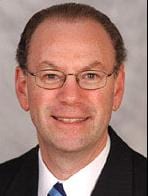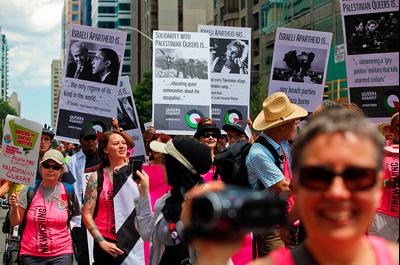
Toronto councillor James Pasternak. Credit: Xtra file photo

Councillor David Shiner. Credit: Courtesy photo
Toronto City Council’s executive committee has asked the city manager to rewrite the city’s anti-discrimination policy to prohibit criticism of Israel, which would directly affect funding for Pride Toronto.
Council requested the review in June because some councillors say Pride Toronto’s $123,807 city grant should be contingent on the non-participation of Queers Against Israeli Apartheid (QuAIA) in the Pride parade.
Nine deputants spoke to the executive committee Sept 10, saying that the phrase “Israeli Apartheid” is “hurtful” and considered “hate speech.”
In 2010, council passed a motion requiring that groups participating in any Toronto festival comply with the city’s anti-discrimination policy. Last year, however, city manager Joe Pennachetti released a report that stated QuAIA’s participation in the parade did not violate the city’s anti-discrimination policy.
In June, following a motion by councillor James Pasternak, city council symbolically condemned the phrase “Israeli apartheid,” although the action had no effect on city policy and QuAIA marched in the 2012 Pride parade.
But councillor David Shiner wants the city to go further, “beyond provincial and federal statutes and legislation.”
Shiner’s original motion did not contain the phrase “Israeli Apartheid.”
Later, he amended the motion, adding a request for the city manager to consider including: “That in respect of the application of the anti-discrimination policy to the grants programs, in light of the purposes of the grants policy and the community complaints, Council also give specific direction for the imposition of a condition of the funding for the 2013 Pride event, that the term ‘Israeli Apartheid’ not be permitted to be used as part of the event.”
Councillor Gord Perks was quick to challenge. “Let me get this straight, you are asking council to restrict speech beyond those that exist in law?”
“Why is criticism of a nation-state unacceptable speech, and why is only Pride the only event we are watching?” Perks asked.
Deputy city manager Brenda Patterson explained the problematic nature of singling out one specific phrase at one city festival. If “Israeli Apartheid” is added, which other potentially offensive terms should also be included?
“In terms of language, so much of this is in the eye of the beholder. We’d have to specify all terms,” she says. “Those may change over time . . . otherwise, we put our staff at risk of being challenged under the Ontario Human Rights Code.”
Pasternak, who complained that QuAIA enjoys “a certain sense of entitlement,” says Pride Toronto should have done more to keep the group out of the 2012 parade.
“Pride came to us and told us about their dispute process. I’ve heard plenty of complaints about their dispute process,” he says. “It’s nothing but a kangaroo court.”
The dispute resolution process, chaired by lawyer Douglas Elliott, was implemented following a recommendation which came out of a series of meetings held by the community advisory panel, CAP. The panel was convened after a bitter three-year public fight over QuAIA’s participation in Pride. PT describes the dispute process as an arm’s-length legal arbitration panel for anyone who wishes to complain about any group marching in the parade. The panel’s decision is supposed to be final.
Elliott says the DRP has received about seven complaints to date. In June, the panel of lawyers dismissed a complaint from B’nai Brith, determining that QuAIA does not fall outside the core mission of Pride Toronto, nor does it “present images or messages that promote, condone or may promote or condone violence, hatred, degradation or negative stereotypes of a person or group.”
“Mr Pasternak is really one of those people with strong opinions on the subject of Israel and I’m afraid it colours anything he has to say on the subject,” Elliott says. “People on the DRP are all very distinguished lawyers, all well-qualified people, certainly more qualified than Mr Pasternak to rule on legal questions . . . I think it’s sleazy politics on his part.”
Using the phrase “Israeli Apartheid” to describe the Israeli government’s policy in regard to the Palestinian Territories is not new, and QuAIA is not the first to say it.
Journalists, academics, and even former US President Jimmy Carter, have called Israel an apartheid state. Desmond Tutu, the 1984 Nobel Peace Prize winner, has said the situation in Israel very much resembles South Africa when it was an apartheid state.
But Shiner disagrees. “[Apartheid] is not happening in that country. I challenge anyone to get on a plane and go see what’s happening. People there are all free in the state of Israel. They are free and they all have their rights there. They are not treated as people were during the horrible events that happened in South Africa.”
The nine to one vote did not include the mayor, who was absent during the debate. The one dissenting vote came from councillor Norm Kelly.
The anti-discrimination policy was sent back to the city manager and will return to executive committee in 2013.

 Why you can trust Xtra
Why you can trust Xtra


